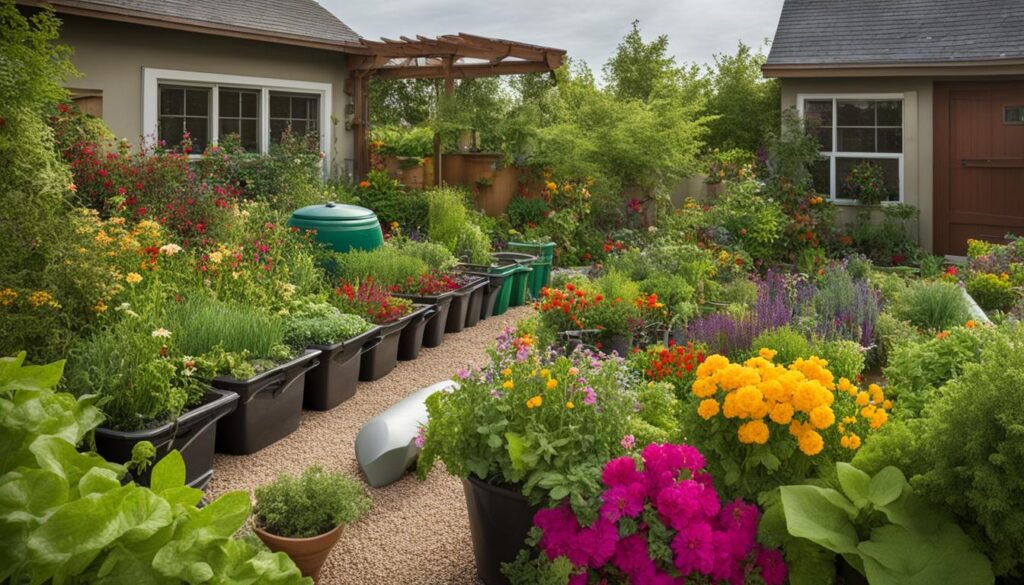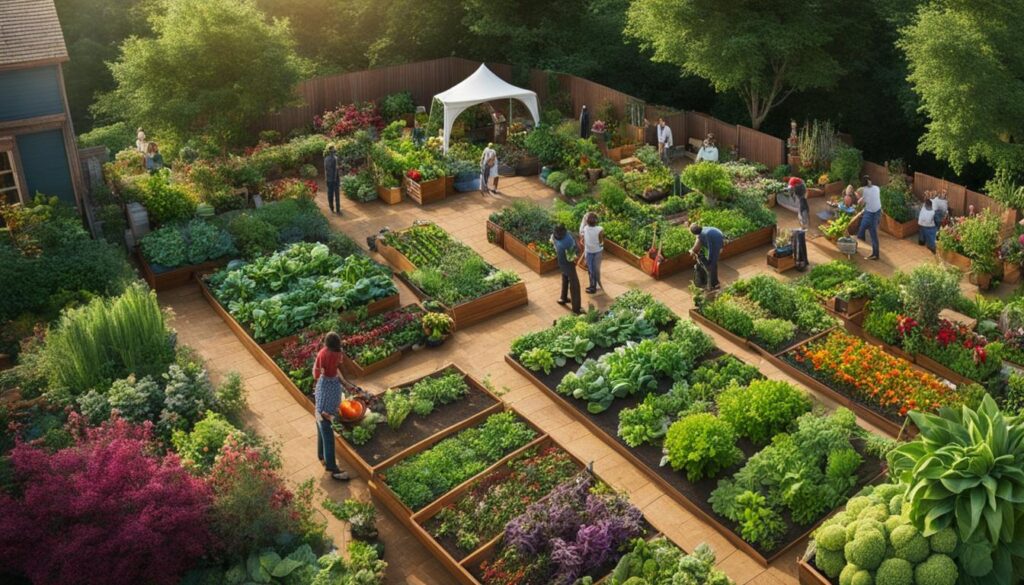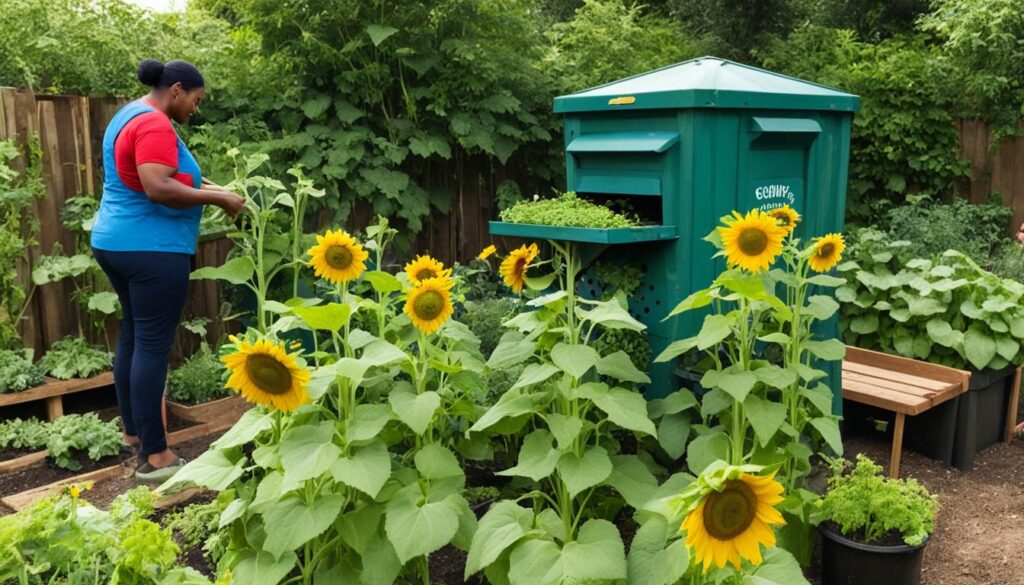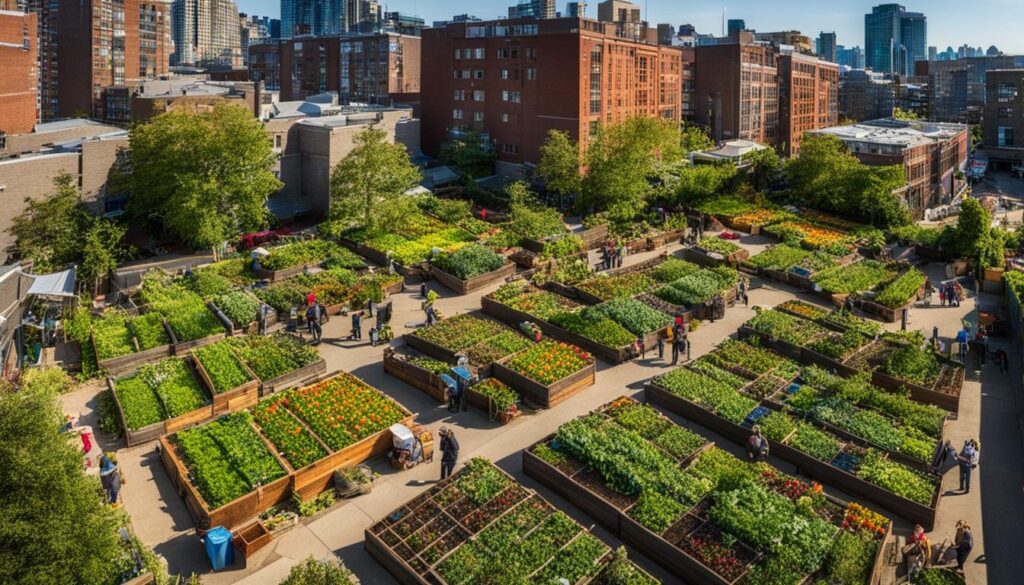Here in Victoria, we have a growing hub of community gardens committed to driving sustainability on a local level. These gardens not only provide fresh, locally grown produce but also encourage sustainable gardening practices and community building.
Through this article, we aim to explore the significance and benefits of community gardens in Victoria in promoting sustainability and eco-friendly practices. We will discuss the various community garden initiatives and projects that are actively working towards growing sustainability locally.
Key Takeaways:
- Community gardens in Victoria play an essential role in promoting eco-friendliness and sustainability on a local level.
- These gardens contribute to locally grown produce, sustainable food systems, and building resilient communities.
- Sustainable gardening practices are vital to the long-term success and viability of community gardens in Victoria.
- Collaborative efforts from the community and various initiatives work to overcome challenges and achieve sustainability goals in these gardens.
- Victoria’s community gardens are nurturing a greener future for all.
Community Gardens in Victoria – An Introduction
Victoria community gardens have emerged as a vital component to promote sustainability in Victoria. These gardens are communal spaces where locals come together to grow produce, cultivate ornamental plants, and foster a sense of community.
At the heart of these gardens is a call for sustainability, and this is reflected in the practices and principles guiding the gardens. Sustainable gardening practices such as composting, water conservation, and organic farming are promoted in these gardens.
The community gardens in Victoria are more than just green spaces. They are providing a platform to cultivate a sense of community and promote eco-friendliness in the city.
The Benefits of Community Gardens in Victoria
Victoria community gardens offer various benefits for the environment, local community, and individuals involved. These gardens contribute to sustainable food systems by producing locally grown and organic produce, which reduces food miles and lessens the carbon footprint associated with transportation.
These gardens also promote healthy eating habits and provide opportunities for individuals to learn about sustainable gardening practices. As a result, community gardens in Victoria help individuals develop a deeper connection with the environment, fostering an appreciation of the value of healthy and sustainable food.
The role of community gardens goes beyond individual benefits to the local community. These gardens are offering a space for community engagement and are facilitating the development of social networks, empowering people to come together and celebrate shared goals.
The Victoria community gardens are a space that provides an opportunity for socialization, education, and environmental awareness.
The Significance of Sustainable Gardening Practices
Sustainable gardening practices are at the core of community gardens in Victoria, and this is fundamental to the promotion of sustainability. The focus is on creating a healthy, thriving environment that can sustain itself long-term.
Community gardens in Victoria embrace a range of sustainable gardening practices, such as companion planting, soil management, and integrated pest management, which preserve the soil’s quality, prevent pest problems, and reduce the use of harmful chemicals.
These practices are integral to creating a sustainable food system and are fundamental to the success of community gardens in Victoria.
Victoria’s community gardens’ commitment to sustainable gardening practices is key to creating a greener, healthier future for all.
The Role of Community Gardens in Growing Sustainable Food Systems
At the heart of community gardens lies their potential to nurture sustainable food systems. By encouraging sustainable gardening practices, community gardens can help reduce the carbon footprint associated with conventional farming. Local production and consumption of locally grown produce can also contribute to the reduction of food miles, which is the distance food travels from producer to consumer.
Community gardens in Victoria offer a unique opportunity for urban and suburban residents to grow their own vegetables, fruits, and herbs. This locally grown produce is often organic and fresher than what is available in supermarkets, making it more nutritious and environmentally friendly to consume. Additionally, growing produce locally helps reduce the need for transportation, packaging, and refrigeration, thereby contributing to a more sustainable food system.

Moreover, community gardens can help encourage healthier eating habits through the promotion of nutritious fresh produce. By cultivating and consuming locally grown produce, community members can reduce their reliance on processed foods and other unhealthy options, contributing to a healthier and more sustainable diet.
Overall, community gardens play a vital role in promoting sustainable food systems and nurturing eco-friendly practices. The growth of these gardens has the potential to enable individuals and communities to contribute to a more sustainable future.
Urban Gardening in Victoria – A Trend Towards Sustainability
Victoria’s urban landscape is undergoing a transformation as the trend towards urban gardening gains momentum. Urban gardening is a sustainable practice that involves cultivating plants in urban spaces such as rooftops, balconies, and community gardens. This practice promotes the dense use of space in urban environments and increases access to fresh produce.
One such initiative is the Victoria Garden Project, which has been instrumental in promoting sustainable urban gardening practices. The project provides resources and support to local communities interested in creating community gardens and hosts events and workshops on sustainable gardening practices.
The Victoria Garden Project has collaborated with other organizations such as the Melbourne City Rooftop Honey to integrate urban gardening practices and promote beekeeping in the city. This collaboration has led to the establishment of honey bee hives on the roofs of commercial buildings and community gardens.
Examples of Urban Gardening Projects in Victoria
There are several urban gardening projects in Victoria that promote sustainable living. The following table shows some examples of these projects:
| Project Name | Location | Initiatives |
|---|---|---|
| Garden City | Port Phillip | The project encourages residents to transform their nature strips into edible and sustainable gardens. |
| Flemington Public Housing Estate Community Garden | Kensington | Located in a public housing estate, the garden promotes social cohesion and sustainability among residents. |
| The Little Veggie Patch Co | Richmond | The project aims to encourage sustainable gardening practices and provide education and resources to the community. |
These projects not only promote sustainable living but also serve as community-building platforms. They encourage individuals to become involved in a shared sustainable vision and learn from each other.
Overall, urban gardening projects in Victoria play an important role in promoting sustainable living and community engagement. They offer an opportunity to transform urban spaces and create eco-friendly urban landscapes that benefit both individuals and communities.
Creating Sustainable Communities through Community Gardens
Community gardens initiatives in Victoria have the potential to create sustainable and resilient communities that prioritize eco-friendliness and locally grown practices. By fostering a sense of togetherness and collective responsibility, community gardens enable individuals to make positive and sustainable choices towards producing their own food and reducing their carbon footprint.
For instance, Joe, a member of a local community garden initiative, shared his experience:
“Being part of a community garden has helped me to connect with my local community, and learn more about sustainable gardening practices. I have started growing my own produce, and I no longer need to depend on packaged and processed foods.”
Community garden initiatives contribute to sustainable food systems by producing locally grown, organic produce, reducing food miles, and promoting healthier eating habits. These gardens also promote biodiversity, providing habitat and food for pollinators and other wildlife.

Moreover, community gardens foster social and educational benefits, enabling individuals to learn about gardening and sustainable living practices. By working together, these initiatives empower individuals to make informed and sustainable decisions, creating a sense of community and belonging in the process.
Community Gardens – A Platform for Social Engagement
Community gardens provide a platform for socializing and community engagement, promoting positive mental health and wellbeing.
According to a study by Victoria University, community gardeners show higher levels of social connectedness, community participation, and emotional wellbeing. These benefits are not limited to the individual gardeners alone, but extend to the wider community, promoting a stronger sense of belonging and social trust.
The Educational Value of Community Gardens
Community gardens also serve an educational purpose, providing opportunities for individuals of all ages to learn about gardening, ecology, and sustainable living practices. By sharing knowledge and skills, community gardeners foster a culture of learning and continuous improvement.
For example, the Ballarat Community Garden in Victoria runs educational workshops and events, providing a space for learning about sustainable gardening and healthy living practices.
Engaging the Community – Collaborative Gardening Efforts
At the heart of community gardens in Victoria are the people. We believe that sustainable gardening practices are best achieved through the collaborative efforts of community members. From planning to cultivating to maintaining these gardens, everyone has a role to play.
Victoria garden projects have benefited greatly from community involvement, and the impact of these efforts on sustainability has been nothing but positive. By coming together to work on these projects, we have accomplished so much more than we could have individually.
The inclusivity of community gardens in Victoria is truly remarkable. People from all corners of the community and beyond have come together to share their knowledge and experiences. This has allowed us to create an ecosystem of sustainable practices, nurturing not only our gardens but also our community members.
Sharing Resources
Community gardens are a platform for sharing resources. Members share tools, produce, and even their gardening expertise. Through these exchanges, we build a sense of community and connectedness.
Education
Community gardening is a great opportunity to educate people on sustainable practices. By working together, we can experiment with different sustainable gardening techniques and share our successes and challenges. This also allows us to promote organic and locally grown produce, which in turn encourages our community to make more environmentally friendly food choices.
“Community gardens not only grow food, they grow community.”
Community Involvement
Victoria garden projects thrive on the involvement of the community. Whether it’s through volunteering, attending workshops, or just showing support, community members play a major role in the success of these projects. By engaging with the community, we have also been able to ensure that the gardens reflect their needs and tastes, providing everyone with a space to belong and contribute.
Collaborative gardening efforts have allowed us to achieve sustainability goals that were once unreachable. We’re proud to have demonstrated how community gardens in Victoria can bring people together to achieve positive environmental and social outcomes.
A Step Towards Environmental Stewardship – Community Initiatives
At Victoria community gardens, we understand that promoting sustainable gardening practices is key to cultivating a greener future. That’s why we’re proud to support various community initiatives and projects that focus on gardening for sustainability.
One such initiative is the “Garden for Wildlife” program, which aims to transform community gardens into habitats for wildlife by planting native species and encouraging biodiversity. This program not only promotes environmental stewardship but also educates the community about the importance of supporting local ecosystems.
Another exciting project is the “Food is Free Laneway” campaign, which involves converting unused laneways into productive gardening spaces. Through this initiative, community members can come together to grow fresh produce, learn about sustainable gardening techniques, and reduce food waste.
Urban Agriculture Network
Victoria community gardens is also part of the Urban Agriculture Network, a collaborative effort by various community groups and stakeholders to promote sustainable and locally grown food systems. This network strives to address food insecurity, reduce the environmental impact of food systems, and educate the community about the benefits of urban agriculture.

“Gardening gives us an opportunity to reconnect with nature and the environment, and to contribute to a sustainable future for generations to come.” – Victoria community gardens member
Through these community initiatives, we are fostering sustainable gardening practices, building resilient communities, and nurturing a greener future for all. Join us in promoting gardening for sustainability and make a positive impact in your local community.
Overcoming Challenges – Sustainability in Community Gardens
Achieving sustainability in community gardens can be challenging, but there are strategies and practices that can help overcome these obstacles and ensure long-term viability.
Challenges Faced by Community Gardens
Community gardens in Victoria face a range of challenges in achieving sustainability goals. These include:
- Inadequate funding and resources
- Lack of community participation and engagement
- Poor soil quality or contamination
- Climate and weather conditions
- Pest and disease management
Strategies for Overcoming Challenges
Despite these challenges, there are strategies and practices that can help community gardens overcome these obstacles and achieve sustainability goals. These include:
“By sharing experiences with other gardeners and community groups, we learn from one another and find innovative solutions to common problems. Together, we can create sustainable and resilient community gardens that benefit both people and the environment.”
Examples of Successful Community Garden Initiatives in Victoria
Victoria has many successful community garden initiatives that have overcome sustainability challenges and achieved long-term viability. For example, the Collingwood Children’s Farm Community Garden has implemented a range of sustainable practices, such as composting, water conservation, and natural pest control, to ensure the garden’s longevity. The Farmhouse Garden in St Kilda East has also implemented sustainable practices, such as rainwater harvesting and soil improvement programs, to overcome challenges and promote sustainability.
| Community Garden Initiative | Location | Sustainable Practices |
|---|---|---|
| Collingwood Children’s Farm Community Garden | Collingwood | Composting, water conservation, natural pest control |
| Farmhouse Garden | St Kilda East | Rainwater harvesting, soil improvement programs |
Conclusion
In summary, we have learned about the significance of community gardens in Victoria and their crucial role in promoting sustainability and eco-friendly practices. These gardens not only provide locally grown produce but also contribute to creating sustainable food systems and building resilient communities.
We have discussed the benefits of community gardens for the environment and the local community, emphasizing the importance of sustainable gardening practices. The rise of urban gardening in Victoria has also been highlighted, showcasing various initiatives and projects that inspire community engagement and foster eco-friendly urban landscapes.
Through their collaborative efforts, community gardens in Victoria have become a stepping stone towards environmental stewardship. We have explored the various community initiatives and projects that promote sustainable gardening practices and contribute to a greener future for all.
Despite the challenges faced in achieving sustainability goals, these gardens persevere through strategies and practices that ensure long-term viability. It is clear that community gardens in Victoria nurture a greener, healthier, and more sustainable future for all. Let us continue to support and engage in these initiatives for the benefit of our planet and our community.
FAQ
What are community gardens in Victoria?
Community gardens in Victoria are communal spaces where individuals come together to grow and cultivate plants, vegetables, and herbs collectively. These gardens are typically located in urban areas and provide opportunities for community engagement, education, and sustainable food production.
What is the significance of community gardens in promoting sustainability?
Community gardens in Victoria play a crucial role in promoting sustainability by encouraging local and organic food production, reducing food miles, and fostering eco-friendly gardening practices. These gardens also contribute to healthier and more resilient communities by providing access to fresh produce and outdoor activities.
How do community gardens contribute to locally grown produce?
Community gardens promote locally grown produce by empowering individuals to grow their own fruits and vegetables. By cultivating plants in these gardens, community members can enjoy the benefits of freshly harvested produce while reducing their reliance on commercially grown and transported food.
What are some sustainable gardening practices encouraged in community gardens?
Sustainable gardening practices in community gardens include organic farming techniques, composting, water conservation, and biodiversity preservation. These practices minimize the use of synthetic chemicals, reduce waste, conserve resources, and promote a balanced ecosystem.
Are there any urban gardening projects in Victoria?
Yes, Victoria is witnessing a rise in urban gardening projects that promote sustainability and enhance urban landscapes. These projects include rooftop gardens, vertical gardens, and community gardening spaces in public areas, schools, and residential complexes, contributing to the greening of urban spaces.
How do community gardens contribute to sustainable food systems?
Community gardens promote sustainable food systems by reducing the distance between food production and consumption. These gardens empower individuals and communities to grow their own food, reducing their reliance on commercially produced and transported food, and supporting local agriculture and self-sufficiency.
What are the benefits of community gardens for the local community?
Community gardens provide various benefits for the local community, including access to fresh and nutritious produce, opportunities for physical activity and outdoor recreation, improved mental well-being, education on gardening and sustainability, and the creation of social connections and community engagement.
How can individuals get involved in community garden initiatives in Victoria?
Individuals can get involved in community garden initiatives in Victoria by joining existing community gardens, volunteering their time and skills, attending gardening workshops and events, and supporting local gardening organizations. They can also initiate new community garden projects and collaborate with local authorities and community groups.
What challenges do community gardens face in achieving sustainability goals?
Community gardens face challenges such as limited space availability, securing funding and resources, managing pests and diseases, and ensuring long-term sustainability amidst changing social and economic dynamics. However, through collaboration, innovative practices, and community support, these challenges can be overcome.
